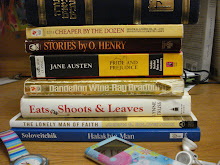...
Tuesday, July 20, 2010
Tisha b'Av
A day on which to mourn. Much has been written, spoken about the difficulty of connecting to Tisha b'Av in the modern era. How do we make ourselves feel pain? How do we manufacture that emotion? My problem, today, is slightly different.
...
...
Subscribe to:
Post Comments (Atom)

1 comment:
I have a similar experience each week. I have trained myself to abhor rest, to believe that productivity is living. Shabbos directly attacks my sense of being. I do not want to stop, I do not want to see that it is ‘very good,’ I do not want to know the difference between days of creation and days of cessation; I want only creation.
But I know of a man who exercised so often with such vigor that now his doctor told him that if he ever stops exercising he will get very sick. I think this is probably true about creativity and happiness as well—it can get to a point where we are dependent on what we originally knew as something crucial to our independence.
I am afraid, at the end of the week, that if I stop for a day, I will never start again, I will never create again; but I have been forced, week after week, to confront this, and so I have never been allowed to become dependent on my creativity. Still, I know that there have been sentences lost and full stories sacrificed. Here, late on a Friday, I admit: I do not look forward to it, and I understand your reluctance on Tisha b’Av. We might agree, though, that the best typist is one who can ‘hunt-and-peck’ when called upon to do so.
But, this all said, it seems to me, from what you’ve written, that your Tisha b’Av was a focused and diligent sojourn in tragedy and mourning; your eyes are not, cannot be, the conduit for so many tears. At times placidity is a truer response to horror than rage or distress.
Post a Comment